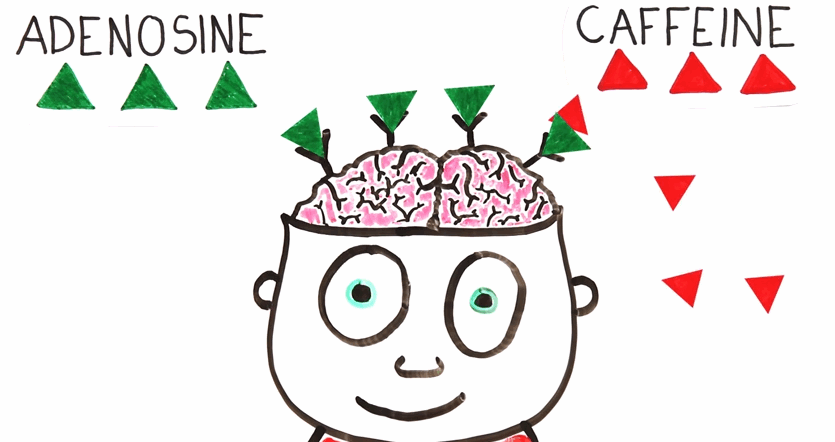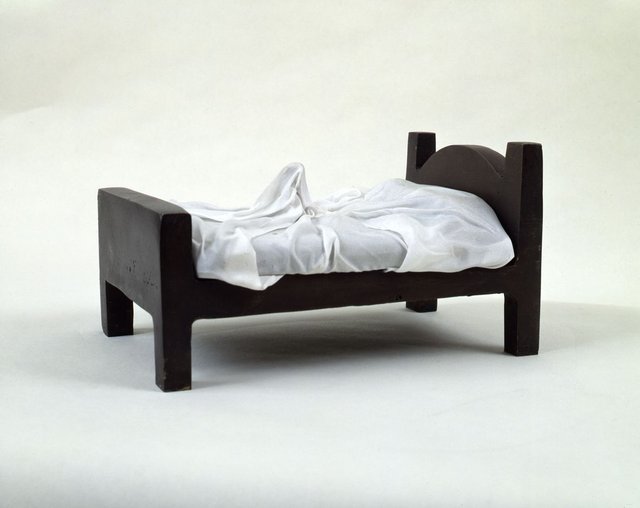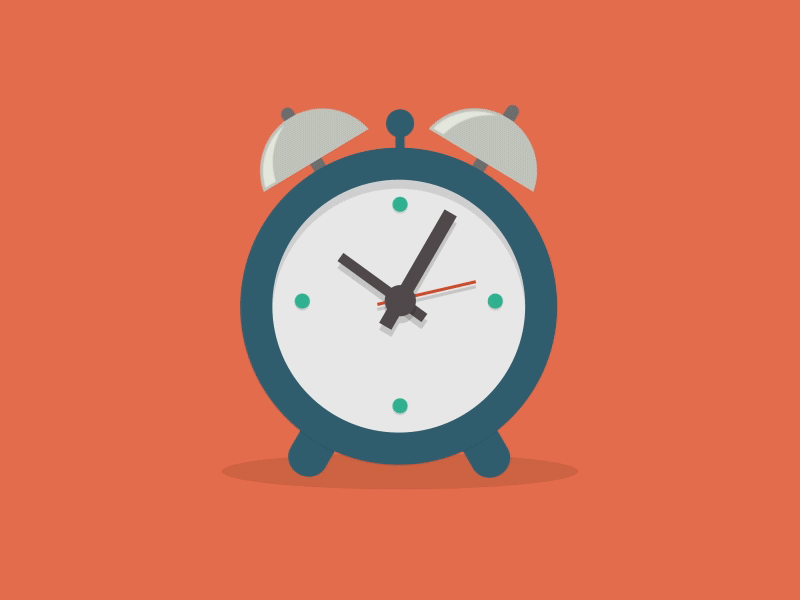Brainiac #1 What do we do @ night?
You slept well tonight? Nice.....because sleep is very important. But strange things happen to you at night.
Every night again....
Every day your body loses a fight. Every day...the rest of your life. You're out of control because it's all pre-programmed. From the moment you wake up in the morning the production of adenosine increases in your brain. Adenosine is a substance that makes you sleepy. The later it is in the day the more it affects the action of the brain cells. There is nothing you can do about it. Caffeine weakens the effect but never completely. Adenosine always wins....It takes over your brain.

23:30 PM
Adenosine does not come alone. When the evening falls adenosine calls for its friend melatonin, the hormone that controls the day / night rhythm of your body. Now the battle is finally lost. You're going to lie down..... Your breathing slows down, you relax your muscles, you close your eyes. Slowly you fall asleep....
Huh! A minute later your arms and legs suddenly shoot in a spastic mode! It feels like the ground is disappearing beneath you.
You are awake again. What happened? You had a hypnagogic shock or a sleep stroke. Nothing to worry about. It's unknown what causes it precisely. It may be the relaxation of your muscles that is recorded in a part of your brain that isn't asleep yet, causing a terrible reflex. Anyhow it belongs to this phase of sleep. You are still in the early stage of your night's rest. If you were awake at this stage you would swear that you weren't asleep yet.

23:40 PM
The images that go through your head in these first minutes of sleep are no more than truncated versions of the dreams that will follow. They contain much less 'special effects'. If you have just played a game for example, it may seem like you're just playing on. It takes a while before those images are extinguished.
After a few minutes it becomes a serious sleep. Your heart rate and body temperature are decreasing. Your body is less affected by sounds and other external influences. After 20 minutes it's really hard to wake you up. If an EEG of your brain would be made to measure electrical activity it would show that it has a very different pattern than during the day. You're in a deep sleep stage.
00:30 AM
All hands on deck!!
You're laying there peacefully in your bed. Nothing indicates that there will be a change in this stage. However after about an hour your heart rate will increase, your breathing will be less intensive, your blood pressure will rise and your brains become warmer. Behind your eyelids your eyes move around very quickly. Rapid Eye Movement is one of the characteristics of REM sleep that has started at this stage. This period is used by the brain to process new information. It's all hands on deck. Your brain is almost as active as when you're awake. Oxygen consumption is even higher than during the day.
It seems that you have other brains during the REM sleep. During the day your brain mainly takes information from the outside world. During the REM sleep your brain is completely focus at the inner mind. What this means will be clear soon enough.... you are dreaming. Your brains produce a colorful collection of memories, experiences and fantasies. Dreams are probably a side effect of the processing and archiving of our experiences we had during the day, which means your brain is incredibly busy during REM sleep. Sometimes dreams are really bizarre because your brain functions very different at this stage: you can't think logically like during the day. Your working memory no longer works so you can't plan anything in your dreams. As a result, you fall from one strange situation to another.
01:00 AM
Stiff like a board
The rest of the night periods of light sleep, deep sleep and REM sleep will alternate each other. A cycle takes about one and a half hour, for children this would be a bit faster. In the second half of the night REM phases last the longest. In total you will dream one and a half to two hours a night. Yes, even if you think in the morning you haven't dreamt anything. Everybody is dreaming.
During the REM periods it is very chaotic in your brain. Still you'll be calm at the outside. In fact, you're not moving anymore. That's a bit creepy about REM sleep: you're in fact paralyzed. Your brain causes you to block the nerves. And that's good because paralysis causes you not to do the things you might dream: hit your partner, vacuum around the house or jump out of the window like Spiderman. Only your eye muscles work and the respiration continues. For the rest, you lay stiff like a board in bed.

02:00AM
Nightly erections
Isn't there any part of your body moving during the REM stage at all? Well....yes there is. Because during this period men often get an erection. Just out of nowhere. And quite regularly: three to four times a night it's standing right up and the erections can take up to half an hour. Speaking about women; the nipples and clitoris swell up. Why? No one knows for sure but it's possible that the body keeps the genitals fit this way. Anyway this part doesn't relate to sex: it also happens if you don't have an erotic dream. Israeli researchers found out that even men who suffer from severe cerebral injuries in a vegetative state still have nightly erections.
After a REM period you can move your body again. And that's just what you will do: A restless sleeper will change position thirty to forty times a night. And there is even the possibility that you get out of bed. Sleepwalking usually occurs during the first hours of the night. It is especially common by children but adults do it too. Why? There is no closing statement yet. If you are very tired, have a fever or have had a lot of alcohol, you will be more likely to do it. Dreaming has nothing to do with sleepwalking because dreaming only occurs in your REM sleep....the part were you're unable to move.

04:00 AM
Subtle sounds
It's late in the middle of the night when you suddenly notice you're awake.
Great chance you wake up from a period of mild sleep, one of the stages that follows the REM sleep that will happen several times. Perhaps you woke up because of a loud noise or just from a very subtle sound. People who are asleep, even deeply asleep, usually respond when they hear their name calling. People (women in particular) can wake up at the least hearable noise from the baby room for example.
It has all the signs that people in their subconscious mind can be alert to danger. Perhaps we have inherited this part of our ancestors who had to sleep in free nature. Either way, you're going to get out of your bed. That's the wisest thing to do if you can't sleep. You read something and eat a little snack. Upon return to your bedroom your brain will immediately associate the darkness and warmth with sleep. You start a new cycle: through light sleep you will fall in a deeper sleep state again.

06:45 AM
TRRRRIINNNGGGG!!
Your night's sleep is almost up. At eight o'clock you have gone through five sleep cycles. Every one and a half hour your brain has undergone a transformation, as you may call the transition between the different phases of your sleep. It was hard work again, like every night. You have transpirated and exhaled a few deciliters of moist. It's getting time to wake up ... TRRRRIIINGGG!
Right, the alarm clock. No time to wake up gradually. The production of the 'stress hormone' cortisol suddenly rises. If you woke up by yourself your body would have taken an hour to warm up slowly and gradually start the production of cortisol. Then you will have finished your REM sleep gradually. Now your dream may be ruined by that alarm clock. In case of men there is a visible evidence: they are stuck for a while with a morning erection.
Either way, your brains finished their nightshift. This means the production of adenosine will start again. The next few hours it will gradually recapture more brain cells. As it happens every day of your life, again and again.

And then, once again, there will be a moment your consciousness is being capitulated and wrapped in that unavoidable sleep state again.
